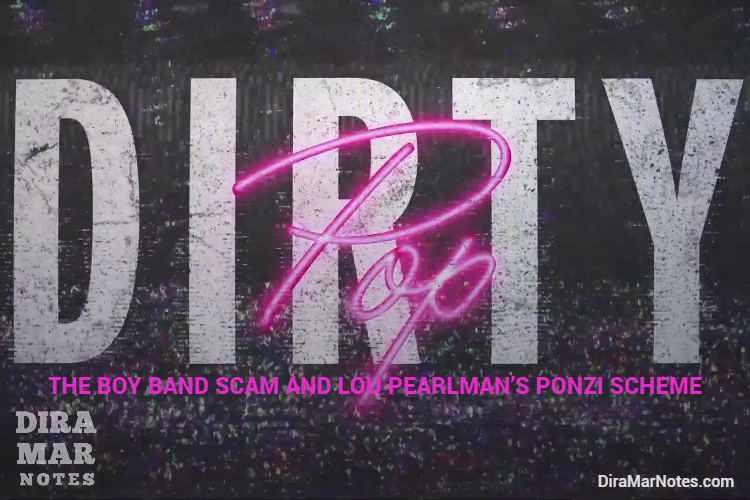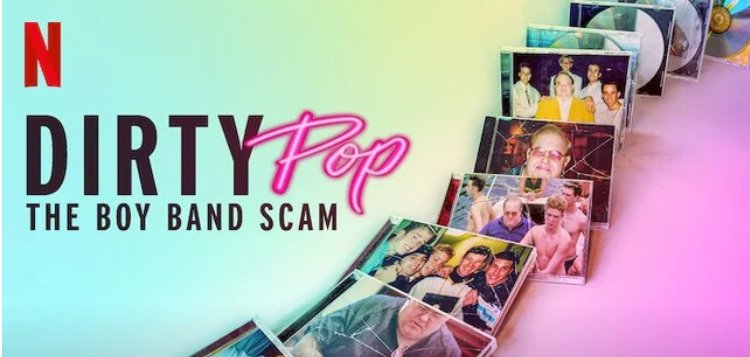
DIRTY POP: THE BOY BAND SCAM AND LOU PEARLMAN’S PONZI SCHEME
The Netflix documentary, “Dirty Pop: The Boy Band Scam,” unveils the shocking tale of Lou Pearlman, the man behind iconic boy bands, and his massive Ponzi scheme.
New Kids on the Block, Take That, The Backstreet Boys, *NSYNC, and Five were boy bands that defined the late 1990s, and early 2000s. Back then, I was deeply immersed in pop music loving the Backstreet Boys, liking *NSYNC and the other boy bands, the girls’ groups like the Spice Girls, All Saints, TLC, Mary Mary, Destiny’s Child and many other stars of the time like Janet Jackson and Britney Spears.
Behind the glitz and glamour of these pop icons lay a darker, lesser-known story of deceit and betrayal. After watching this documentary the *NSYNC song “Bye, Bye Bye” has even more significance, not to mention its return to the zeitgeist as part of the soundtrack and its prominent part at the beginning of Deadpool & Wolverine.
ABOUT DOCUMENTARIES
Before diving into this topic, let’s clarify something about documentaries—especially documentaries from the last decade. Recent Netflix documentaries often reflect the creators’ viewpoints, resulting in narratives that aren’t always objective or comprehensive. This approach can sometimes skew the representation of events, emphasizing certain perspectives while neglecting others.
For instance, the Netflix documentary African Queens covering the history of Cleopatra faced criticism for its dramatized portrayal and perceived historical inaccuracies, leading some viewers to question its authenticity. Given that documentaries are meant to showcase realistic viewpoints, such dramatizations blur the line between factual storytelling and creative interpretation, making it challenging to distinguish between fact and fiction.
As a result, audiences are encouraged to view these works with a critical eye and consider multiple sources to gain a well-rounded understanding of the topics presented. Taking all this into consideration let’s dive into it.
THE RISE OF A MUSIC MOGUL
Lou Pearlman, a charismatic entrepreneur, founded Trans Continental Records in the early 1990s. He quickly rose to fame by discovering and managing boy bands like the Backstreet Boys and *NSYNC. Pearlman’s charm and business acumen turned him into a central figure in the music industry, and his promise of fame and fortune drew in many aspiring artists. However, as Netflix’s documentary reveals, his empire was built on lies and exploitation.
THE FRAUDULENT SCHEME
Pearlman’s deceit extended beyond the music industry. He orchestrated one of the largest Ponzi schemes in American history, defrauding investors out of an estimated $300 million. He lured investors with promises of high returns, using funds from new investors to pay off earlier ones. This classic Ponzi scheme began to unravel in the early 2000s, but by then, the damage was done.
Pearlman’s fraudulent activities were not confined to the music industry. He established a series of fictitious companies under the Trans Continental brand, including Trans Continental Airlines, and Trans Continental International. These companies were involved in air travel and blimp advertising, yet they existed mainly on paper. Pearlman fabricated financial statements and documents to make these companies appear profitable, which helped him attract even more investors. He also established Trans Continental Entertainment and Trans Continental Talent.
According to Forbes, Pearlman used his boy band empire as a front, creating an illusion of profitability and success to attract more investors. His reputation in the music industry made it easier for him to gain their trust. As detailed by ABC News, his victims included not just wealthy investors but also ordinary people who believed in his promises.
THE VICTIMS
Lou Pearlman impacted many people, from the young boys he worked with, to his investors, and even his lawyers.
THE BOY BANDS
The boy bands were among Pearlman’s most notable victims. Members of the Backstreet Boys and *NSYNC, who were once household names, found themselves embroiled in legal battles over unpaid royalties and unfair contracts. Pearlman had inserted clauses that allowed him to take a significant portion of their earnings, leaving the artists with a fraction of what they deserved. Just imagine, if your boss, who already earns a significant amount, takes without clear negotiations a significant portion of your salary because he paid for your employee training.
The 2015 Backstreet Boys documentary “Show ‘Em What You’re Made Of “shows a part of their story. The psychological impact on these young stars was profound. Many of them were teenagers when they signed with Pearlman, and they placed immense trust in him. The betrayal they felt was not just financial but deeply personal.
THE ELDERLY
Another group that suffered was the elderly who invested their 401k and life savings in Pearlman’s ventures. Elderly investors were particularly affected because they often had limited financial resources and were relying on the investments for their retirement savings. The losses from Pearlman’s scheme could significantly impact their financial stability and quality of life.
The realization that their savings were lost due to fraud can be devastating, especially for those nearing retirement. The stress and anxiety from such financial losses can have serious emotional and psychological effects.
Many victims, including the elderly, sought legal recourse to recover their lost funds. This often involved complex legal battles and working with bankruptcy courts, as Pearlman’s assets were seized and liquidated to repay some of the defrauded investors. Recovery efforts were often slow and may have only returned a fraction of the losses.
The case highlighted the need for better financial education and protections for elderly investors. It underscored the importance of verifying the legitimacy of investment opportunities and being cautious of offers that seem too good to be true.
THE LAWYERS
Pearlman’s charm and manipulative abilities likely played a role in deceiving his legal team. By presenting himself as a credible and successful businessman, he might have convinced his lawyers to take on his case under false pretenses, believing they were representing a legitimate entrepreneur rather than a fraudster.
To facilitate the Ponzi scheme, Pearlman orchestrated wire transfers through accounts that, in reality, did not exist. This helped him divert funds, make fraudulent payments, and maintain the illusion of legitimate financial activity. So, when the lawyers thought they were paid, they weren’t.
THE CONSEQUENCES
Lou Pearlman’s scheme finally came to an end in 2006 when he was arrested and charged with conspiracy, money laundering, and making false statements during a bankruptcy proceeding. He was sentenced to 25 years in prison, where he remained until he died in 2016.
The fallout from his crimes was extensive. Hundreds of investors lost their life savings and the boy bands he managed spent years recovering from the financial and emotional damage. The music industry, too, was forced to reckon with the dark side of its rapid commercialization.
It’s disappointing to see how some people still try to justify what he did or are still in denial about his wrongdoings and it reveals a lot about the culture we still live in where accountability, transparency, and integrity are not taken seriously making it easier for these schemes to take place.
A CALL TO ACTION
“Dirty Pop: The Boy Band Scam” serves as a stark reminder of the importance of vigilance and accountability. It underscores the need for transparency in business practices and the dangers of unchecked power and influence.
For those who suspect wrongdoing or are aware of fraudulent activities, it is crucial to speak up. Whistleblowers play a vital role in uncovering corruption and protecting the interests of the vulnerable. Organizations and individuals must foster environments where transparency and honesty are valued over profits and power.
By encouraging whistleblowers and fostering a culture of integrity, we can prevent future scams and protect the dreams of aspiring artists and investors from exploitation. It’s dangerous to believe that there is only one path to fame and wealth, especially when such ideas are promoted uncritically by the media. We must remain vigilant and question these narratives to safeguard aspiring artists and investors against this type of manipulation.
FINAL THOUGHTS
Lou Pearlman’s story is a cautionary tale of how one man’s greed and deception led to the downfall of an empire and the ruin of many lives. The glittering facade of pop stardom often conceals harsh realities. “Dirty Pop: The Boy Band Scam” sheds light on the far-reaching consequences of his actions, urging us to remain vigilant and to hold those in power accountable.
In a world where fame and fortune can often overshadow integrity, this documentary is a powerful call to protect the vulnerable & champion the truth. It gives a sobering insight into the real cost of Pearlman’s deception. The boys only got a fraction of their earnings when they started. They only started to earn good money when they cut loose from Pearlman. They got a favorable ending. The lawyers at least got paid something while most of the Trans Continental investors didn’t.
References
ABC News. (2019). Lou Pearlman, Backstreet Boys, *NSYNC lured people into a massive Ponzi scheme. ABC News.
Chu, J. (2015). Backstreet Boys: Show ‘Em What You’re Made Of [Documentary]. Gravitas Ventures.
Mercuri, M. (2024). The wild true story behind Netflix’s “Dirty Pop: The Boy Band Scam” and Lou Pearlman’s Ponzi scheme. Forbes.
Netflix Tudum. (2024). Dirty Pop: The Boy Band Scam: Release date, trailer, news. Netflix.
Netflix Tudum. (2024). Dirty Pop documentary: Lou Pearlman and the boy band scam. Netflix.
Smith, L. (2024). Netflix’s “Dirty Pop” documentary exposes Lou Pearlman’s dark side. MSNBC.
Smith, J. P. (2023). African Queens [TV series]. Netflix.
All images and videos in this publication belong to the original creators and are used as references under fair use.




